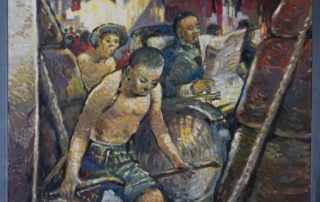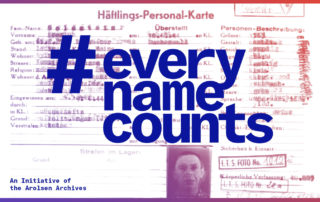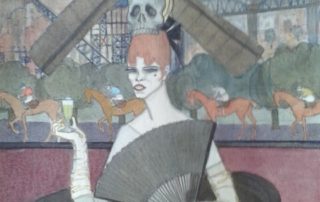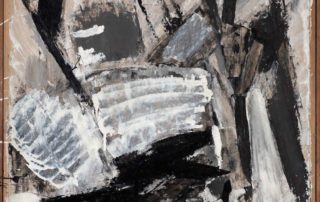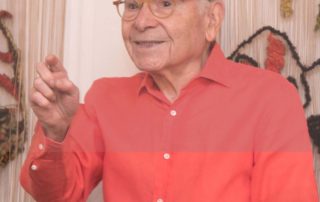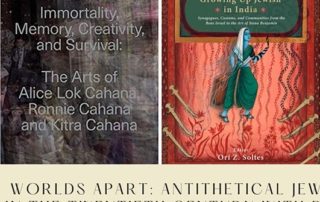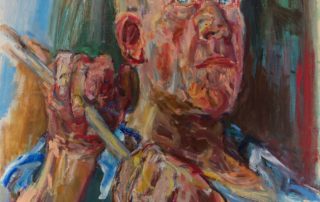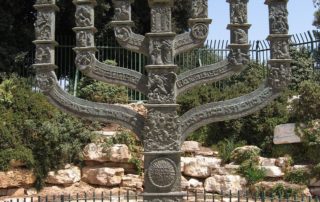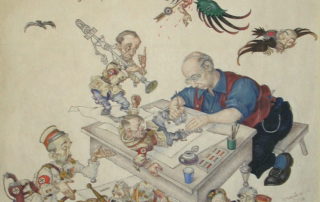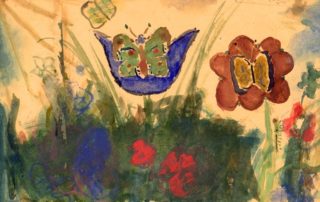Rachel Stern2022-02-18T05:25:20-05:00May 11th, 2021|Events, Lectures, Past Events|
Presentation by Steven Less, PhD Senior research fellow emeritus of the Max Planck Institute for Comparative Public Law and International Law and son of the artist in Heidelberg (Germany) and Hannah-Lea Wasserfuhr PhD Candidate at the Center for Jewish Studies in Heidelberg, Heidelberg (Germany) Moderated by Rachel Stern Director and CEO of the Fritz Ascher Society in New York Born in Berlin, John Hans Less (1923 – 2011) fled to Shanghai in September 1940 as a 16-year-old together with his family to escape Nazi persecution. Largely dependent on relief organizations to survive, the Less family soon went through further disruptions when the Japanese occupied the city and later confined Jewish refugees to the Hongkew [...]
Rachel Stern2022-02-18T06:42:00-05:00May 11th, 2021|Events, Past Events|
Join the Fort Tryon Jewish Center (FTJC) and the Fritz Ascher Society for a LIVE DATA ENTRY EVENT to help build the world’s largest digital monument to victims of the Holocaust: the Arolsen Archives’ #everynamecounts. THIS EVENT WAS NOT RECORDED. Opening Remarks Rabbi Guy Austrian Fort Tryon Jewish Center in New York Rachel Stern Director and CEO of the Fritz Ascher Society in New York Introduction and Moderation Elizabeth Berkowitz Digital Interpretation Manager of the Fritz Ascher Society in New York #everynamecounts is a crowd-sourced data entry initiative to return the names of Holocaust victims, their families, and details of their lives into the findable, keyword-searchable public record. Participants enter information about Nazi victims and family members from digitized [...]
Rachel Stern2022-02-18T05:46:15-05:00April 29th, 2021|Lectures, Past Events|
Lecture by Dr. Martina Weinland Commissioner for Cultural Heritage at the Museum of the City of Berlin in Berlin (Germany) Followed by Q&A moderated by Rachel Stern Director and CEO, Fritz Ascher Society in New York The Berlin artist Jeanne Mammen (1890-1976) is best known for her depictions of strong, sensual women and Berlin city life. But there is much more to her 70 years of artistic output, with unique sketches, paintings and sculptures. In 1975, she tells the art historian Hans Kinkel, who conducts the only interview she will ever give: “You must always write that my pictures were created between 1890 and 1975. …I have always wanted to be just a pair of eyes, walking through [...]
Rachel Stern2022-02-18T05:30:25-05:00April 25th, 2021|Events, Lectures, Past Events|
Lecture by Nicola Baird Research Officer and Curator at Ben Uri Gallery and Museum, London Introduced by Rachel Stern Director and CEO of the Fritz Ascher Society in New York Born in Germany to Polish-Jewish orthodox parents in 1926, Gustav Metzger (1926-2017) was one of 10,000 Jewish children evacuated in 1939 to London as part of the Kindertransport. His parents, eldest brother, and maternal grandparents, all perished in the Holocaust. Upon the advice of Henry Moore, Metzger spent six months at the Cambridge School of Art, before enrolling at the Sir John Cass Institute in 1946, where he studied sculpture and attended David Bomberg’s life drawing classes at the Borough Polytechnic, alongside contemporaries [...]
Rachel Stern2022-02-18T05:27:54-05:00April 20th, 2021|Events, Lectures, Past Events|
Lecture by Helen Shiner Director/Editor at the Moissey Kogan Catalogue Raisonné of Sculpture & Prints, Oxford (UK) Introduced by Rachel Stern Director and CEO of the Fritz Ascher Society in New York Moissey Kogan (1879-1943) was an innovative, influential sculptor-craftsman and printmaker, whose career straddled the European avant-gardes of the first half of the 20th century. A cosmopolitan Russian Jew, whose work was marked by his interest in Jewish mysticism and theosophical beliefs, Kogan looked to non-European cultures and ancient sources, in common with many of his contemporaries in Munich, Berlin, Amsterdam, and Paris, to root his avant-garde experimentations and revivals of ancient techniques, in what were considered more authentic means of expression. On the day [...]
Rachel Stern2021-06-14T18:07:03-04:00March 31st, 2021|Events, Past Events|
THIS EVENT WAS NOT RECORDED. After surviving the Holocaust, Shoshana Comet (1923-2012) could not speak about her experiences. One day in 1968, Shoshana announced that she had joined a course on weaving. At home, she wove five 6-foot high tapestries which served as a means to unshackle herself from her holocaust trauma. Shoshana then trained to become a psychotherapist, working with Holocaust survivors and their families who had been scarred by their experience. (See Ted Comet, Transforming Trauma Into Creative Energy, March 10, 2014) Ted is giving tours of Shoshana's tapestries to diverse groups, including students from Germany. For the past year, these tours are virtual, developed and conducted by DOROT, an innovative leader in designing intergenerational programs, supportive services and opportunities that enhance the [...]
Rachel Stern2022-02-18T06:23:24-05:00March 30th, 2021|Events, Past Events|
Conversation with Dr. Meital Orr and Dr. Ori Z. Soltes Opening remarks Rachel Stern, Fritz Ascher Society forPersecuted, Ostracized and Banned Art Anke Yael Popper, Embassy of the Federal Republic of Germany Organized by the Center for Jewish Civilization at Georgetown University in Washington D.C. This program delves into the following books by Ori Z Soltes: Immortality, Memory, Creativity, and Survival: The Arts of Alice Lok Cahana, Ronnie Cahana, and Kitra Cahana This book reviews the story of a 14-year-old girl from Sarvar, Hungary who was deported to Auschwitz by the Nazis, together with her family. She was the sole survivor of the deportation and transit through three different camps, ended up marrying a rabbi, moving to Houston, Texas, [...]
Rachel Stern2022-02-18T06:37:23-05:00March 4th, 2021|Events, Past Events|
The International Tracing Service (ITS), since 2019 called Arolsen Archives, was established by the Allies in 1948 as a central search and information center. They house the world’s most extensive collection of documents about the victims of National Socialist persecution, including documents from Nazi concentration camps, ghettoes and penal institutions, documents about forced laborers, and documents from the early post-war period about Displaced Persons, mainly Holocaust survivors, former concentration camp prisoners, and forced laborers. People who had fled the sphere of influence of the Soviet Union for political reasons are also included. The archive's holdings consist of 30 million documents in total and belong to UNESCO’s Memory of the World. At this event, Floriane Azoulay (Director) and Giora Zwilling (Deputy [...]
Rachel Stern2022-02-18T06:04:58-05:00March 3rd, 2021|Events, Lectures, Past Events|
The Austrian artist Oskar Kokoschka (1886-1980) achieved world fame with his intense expressionistic portraits and landscapes. Rüdiger Görner, author of the first English-language biography, depicts the artist in all his fascinating and contradictory complexity. He traces Kokoschka’s path from bête noire of the bourgeoisie and a so-called ‘hunger artist’ to a wealthy and cosmopolitan political and critical artist who played a major role in shaping the European art scene of the twentieth century and whose relevance is undiminished to this day. In 1934, Kokoschka left Austria for Prague, and in 1938, when the Czechs began to mobilize for the expected invasion by the German Wehrmacht, Kokoschka fled to the United Kingdom, where he remained during the war. Although he [...]
Rachel Stern2022-02-18T07:06:06-05:00February 22nd, 2021|Events, Lectures, Past Events|
Born 1877 in Dortmund, the sculptor Benno Elkan (1877-1960) first studied painting in Munich and Karlsruhe. At the end of his studies, he turned to sculpture. As a young artist, he spent time in Paris, Rome, and Frankfurt. Elkan’s oeuvre was largely made up of commissions. In the beginning, he mainly created tombs. Medals, portrait busts of well-known personalities, monuments to victims and candelabras follow, partly for the religious (Jewish and Christian) context. Elkan fled persecution by the German Nazi regime to Great Britain in 1934and lived with his family in London until the end of his life. Perhaps the most important work besides the Menorah in Jerusalem (1956) was never built: Memorial to the Defenseless Victims of the Bombing [...]
Rachel Stern2022-02-18T06:31:18-05:00February 17th, 2021|Events, Lectures, Past Events|
During the first four decades of the twentieth century, Polish Jewish artist Arthur Szyk (1894–1951) was best known for his richly detailed book illustrations and magnificent illuminations on Jewish themes. He portrayed the Jews as a heroic nation that had resisted oppression through the ages and eventually triumphed. His Jews were fighters for their own freedom and the freedom of others. Szyk sought to redefine how the Jews viewed themselves and how others viewed them. His works thus challenged the notion that Jewish history was merely one long saga of suffering and, at the same time, refuted the then common antisemitic canard that the Jews were a cowardly people. With the coming to power in Germany of Adolf Hitler [...]
Rachel Stern2022-02-18T07:19:09-05:00January 11th, 2021|Events, Lectures, Past Events|
WATCH THE RECORDING OF THIS EVENT HERE. Visual art during and after the Holocaust, by victims and survivors eloquently contradicts the famous comment by Theodor Adorno that "after the Holocaust to make art is barbaric." On the contrary, it was and is necessary: as part of the record of events as they were transpiring, and as part of the human response to horror--to express anger, to raise questions, to offer healing--in the time after those events. Who creates the art and what kind of art is created? What role does it play in wrestling with the question of what God is and what we humans are? These issues have implications both from within the heart of the Holocaust and from well beyond its particular boundaries. [...]


